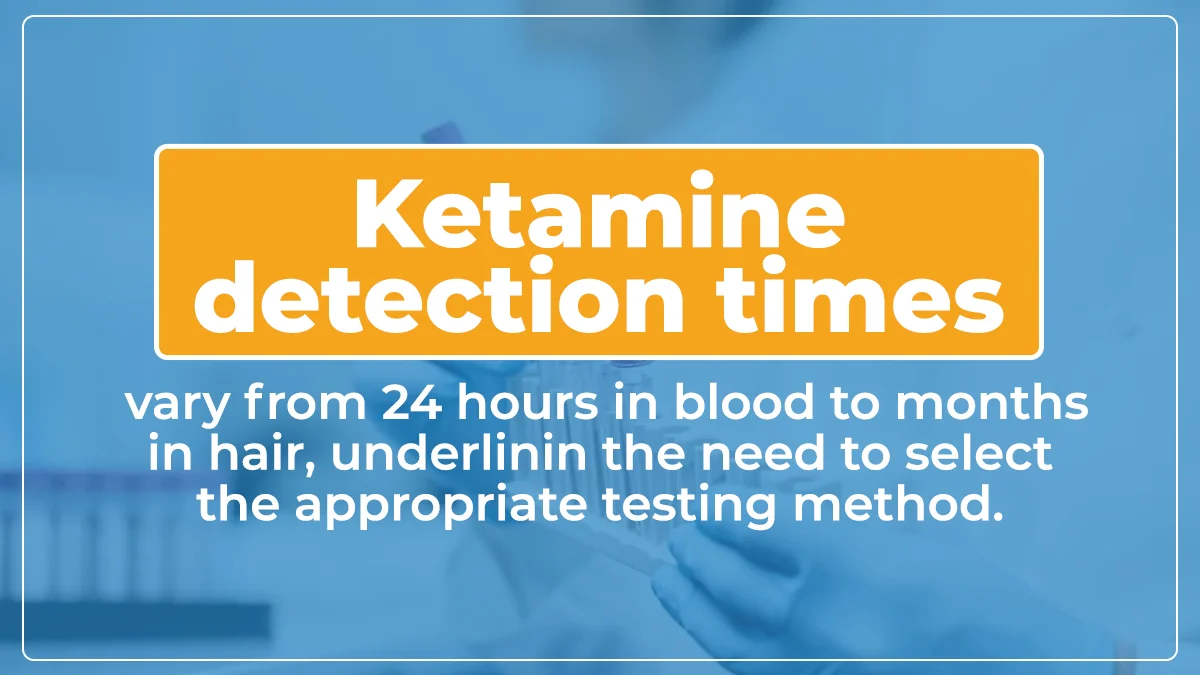
Lyrica With Suboxone: Risks And Safe Practices
The Recovery Team-Newton explores whether taking Lyrica with Suboxone is safe. Explore potential risks and guidelines

Ketamine is a fast-acting drug, but its effects and traces in the body can last for different periods. After administration, ketamine’s effects can be felt within minutes and typically last for about an hour. However, ketamine can stay in the body much longer.
Ketamine is also misused as a recreational drug, often referred to as “Special K.” Ketamine is usually detectable in urine for up to 14 days after use, depending on the dose and frequency of use. Blood tests can detect ketamine for up to 24 hours, while hair tests can find traces for several months.
Ketamine’s strong effects and lasting presence highlight the need for thorough monitoring and treatment options to manage its misuse. Here’s what you need to know:
The Recovery Team-Newton provides comprehensive treatment for Ketamine addiction, offering support and therapy to aid in recovery. For more information, contact us at (508) 978-2772
Ketamine is a medication commonly used for starting and maintaining anesthesia. It works by inducing a trance-like state, providing pain relief, sedation, and memory loss. In recent years, it has gained attention for its potential to treat depression and chronic pain. However, ketamine also poses risks when used outside medical supervision, leading to significant concerns about its recreational use and abuse.
Ketamine is primarily used in hospitals and clinics as an anesthetic. It is valuable in emergencies because it quickly sedates patients while maintaining their airway reflexes and stable blood pressure. Additionally, research has shown that ketamine can help treat severe depression and suicidal thoughts, often providing rapid relief when other treatments fail.
Despite its medical benefits, ketamine is also abused recreationally. People use it for its hallucinogenic effects of dissociative drugs, often referred to as a “K-hole.” Recreational use can lead to serious health issues, including memory problems, bladder damage, and severe mental health issues. Chronic abuse of ketamine can result in addiction, making it hard for individuals to stop using it without professional help.
Pharmacokinetics refers to how a drug moves through the body. Ketamine’s pharmacokinetics involve four main processes: absorption, distribution, metabolism, and elimination. Understanding these processes helps us grasp how long ketamine stays in the system and its effects.
Ketamine is absorbed quickly in the body, especially when administered intravenously or intramuscularly. When taken orally, absorption is slower due to the digestive process. Rapid absorption leads to its fast-acting effects, which is why it is often used in emergency medical settings.
Once in the bloodstream, ketamine distributes rapidly throughout the body, including the brain. Its ability to cross the blood-brain barrier contributes to its strong anesthetic and hallucinogenic effects. Distribution happens within minutes, making ketamine effective for quick sedation.
The liver metabolizes ketamine into several metabolites, the most significant being ketamine. These metabolites also have anesthetic properties, though they are less potent than ketamine. Metabolism varies between individuals based on factors like liver function and genetic differences, affecting how long ketamine stays in the system.
Ketamine and its metabolites are primarily excreted through urine. The elimination half-life of ketamine is about 2.5 to 3 hours, but complete elimination can take longer, especially with chronic use. Residual traces can remain detectable in urine for up to two weeks. The elimination process is vital to consider in addiction treatment.
Detecting ketamine in the body involves several methods, each with its detection window. These methods are important for understanding ketamine’s presence and for guiding addiction treatment efforts.
Blood tests for ketamine are practical but have a short detection window. Ketamine can be detected in blood within minutes of use and remains detectable for up to 24 hours. This method is helpful in emergency settings to determine recent use.
Urine testing is one of the most common methods for detecting ketamine. It can identify the drug and its metabolites for up to 14 days after use. This makes urine tests valuable for monitoring individuals undergoing addiction treatment.
Hair testing offers the most extended detection window for ketamine, capable of identifying use for several months. As hair grows, it traps drug metabolites, providing a historical record of substance use.
Saliva testing for ketamine is non-invasive and easy to administer. It can detect ketamine within minutes of use and up to 48 hours afterward. This short detection window makes it suitable for assessing recent use but less effective for long-term monitoring.
Several factors determine how long ketamine stays in the body. These factors impact the detection windows and effectiveness of medical procedures for ketamine misuse.
Higher doses and frequent use of ketamine result in longer detection times. Chronic use leads to accumulation in the body, making it detectable for extended periods. This accumulation complicates treatment efforts and requires a tailored approach to manage withdrawal and recovery.
An individual’s metabolic rate significantly influences how quickly ketamine is processed and eliminated. People with faster metabolism break down ketamine faster, reducing the detection window. Conversely, those with slower metabolisms may retain the drug longer, impacting treatment timelines and strategies.
Age and sex affect how ketamine is metabolized. Younger individuals typically have faster metabolisms, leading to quicker elimination. Men and women process drugs differently due to variations in body fat and hormones, which can affect the duration ketamine stays in the system.
Existing health conditions, especially liver and kidney diseases, impact how ketamine is metabolized and excreted. Impaired liver function slows down the breakdown of ketamine, prolonging its presence in the body.
Combining ketamine with other substances, such as alcohol or drugs, can alter its metabolism and excretion. These interactions can extend the detection window and increase the risk of adverse effects. This factor is essential in addiction treatment, as it necessitates a comprehensive approach to address multiple substances and their combined impacts.
Different drug testing methods detect ketamine over varying periods. Understanding these differences helps choose the proper drug test for treatment and monitoring.
Detection times vary significantly between immediate use and chronic use. For immediate use, blood tests can detect ketamine for up to 24 hours, while saliva tests are practical for about 48 hours. Urine tests can identify ketamine for up to 14 days after a single use, but chronic use can extend this period due to drug accumulation in the body.
Individual variability plays a significant role in detection times. Factors such as metabolic rate, age, sex, and overall health influence how long ketamine stays in the system. People with faster metabolisms or better overall health may process and eliminate ketamine more quickly, shortening detection windows.
Eliminating ketamine from your system can be challenging, but specific strategies can help speed up the process. These methods support the body’s natural detoxification and are essential for addiction treatment.
Drinking plenty of water helps flush ketamine and its metabolites out of your system through urine. Staying well-hydrated increases urine production, aiding in the faster elimination of toxins. Proper hydration supports kidney function, vital in filtering and expelling ketamine from the body.
A healthy diet and regular exercise boost metabolism, helping your body process and eliminate ketamine more efficiently. Eating foods rich in antioxidants, like fruits and vegetables, supports liver function and overall detoxification.
Medical detox programs provide supervision of medical professionals and support for those seeking to eliminate ketamine from their system. These programs often include medications to ease ketamine withdrawal symptoms and therapies to support overall health.
Ketamine use carries significant risks and side effects. It is essential to be aware of these to make informed decisions and seek appropriate treatment.
Short-term effects of ketamine can occur quickly after use and include both mental and physical symptoms. Physically, ketamine can cause increased heart rate, high blood pressure, nausea, mood swings and vomiting. Mentally, it can lead to hallucinations, confusion, and a dissociative state where users feel detached from their body or surroundings. These effects can be distressing and dangerous, particularly without medical supervision.
Long-term ketamine use can lead to severe health issues. Chronic use can cause memory problems, difficulty concentrating, and persistent hallucinations. Physically, it can damage the bladder and kidneys, leading to a condition known as ketamine bladder syndrome, which causes pain and difficulty urinating.
Several factors influence how long ketamine remains detectable in your system. These include the dosage and frequency of use, metabolic rate, age and sex, existing health conditions, and the combination with other substances.
High doses and frequent use of ketamine can prolong its detection window, while individuals with faster metabolisms may eliminate it more quickly. Younger individuals typically metabolize drugs faster than older individuals and men and women may process ketamine differently due to biological differences.
Health conditions, especially liver and kidney diseases, can affect ketamine metabolism and excretion. Combining ketamine with other substances can also alter its detection window and increase health risks.
Developing tolerance to ketamine over time is relatively common among individuals who misuse the drug. Tolerance occurs when the body adapts to the presence of ketamine, requiring higher doses to achieve the same effects. This can lead to a cycle of escalating use, increasing the risk of dependence and addiction.
Tolerance to ketamine can develop quickly, especially with frequent or chronic use. As tolerance increases, individuals may experience diminished effects from the drug, prompting them to seek higher doses, which can lead to serious health consequences. Seeking professional addiction treatment is essential for breaking the cycle of tolerance and dependency on ketamine.
At The Recovery Team-Newton, we excel in guiding individuals through the complexities of addiction.
Our comprehensive approach to recovery provides a range of specialized services tailored to individual needs. From personalized therapy sessions addressing underlying issues to evidence-based counseling techniques, we equip our clients with the tools and support to achieve lasting sobriety.
Whether you’re struggling with Ketamine addiction or any other substance use disorder, our dedicated team is here to help.
Contact us today at (508) 978-2772 to take the first step towards a healthier, substance-free future.

The Recovery Team-Newton explores whether taking Lyrica with Suboxone is safe. Explore potential risks and guidelines

Learn about Suboxone injection side effects and explore recovery solutions in this guide by The Recovery Team-Newton.